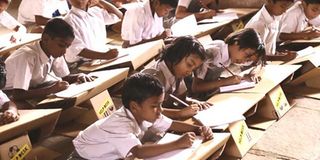Let there be desks and bags for pupils

Children learn using convertable boxes as desks at a school in India. PHOTO | SPARKNEWS
What you need to know:
- Children often sit on the floor with their backs hunched for about five hours every day, which affects their eyesight and posture.
- This is one of several reasons that many drop out of school.
By recycling cardboard boxes into a combination of a backpack and a school desk, an Indian NGO has given children a way to study in comfort — and a reason to stay in school.
Ganesh Sanas, seven, used to walk three km every morning to school in Wai district, in the state of Maharashtra, with his books stacked up in his tiny hands.
But last year children in his school were each given a strange-looking cardboard box. It had enough space for their books and lunch bags.
When emptied, it doubled up as a desk. The top of the desk stood about 50cm high, allowing children to sit comfortably cross-legged on the floor and to work upright.
For a child who owned neither a backpack nor a desk, this hybrid object was a new and compelling reason to go to school.
Education in India is as varied as its diverse population. While international schools in cities have facilities that surpass classrooms in some Western countries, rural schools often lack walls and clean toilets.
Therefore, a huge chunk of the country’s population — those who cannot afford expensive private education — go to school in their early years and then drop out.
SIT ON THE FLOOR
In 2009, India’s federal government passed the Right to Education Act that promised free and compulsory education to all children. The equivalent of roughly $500 billion was allocated to it.
However, programmes under this Act do not ensure the availability of desks, bags, or even toilets.
Children often sit on the floor with their backs hunched for about five hours every day, which affects their eyesight and posture.
This is one of several reasons that many drop out of school. According to the government, dropout rates in elementary schools in rural India stand at about 40 per cent.
Thanks to the desks’ affordability, Aarambh was able to distribute them to 2,000 students in rural parts of Western Maharashtra last year.
“When other schoolchildren began asking for the desks we realised that we had achieved a small victory,” said Shobha Murthy, the founder trustee of Aarambh.
Because the help desk experiment was immensely successful, the government of neighbouring Madhya Pradesh came forward asking to use it not only in schools, but also as an employment-generating programme for young people who could build the desks.
“It can’t get better than if children get the bags and youths have a way to earn money,” Murthy said.



